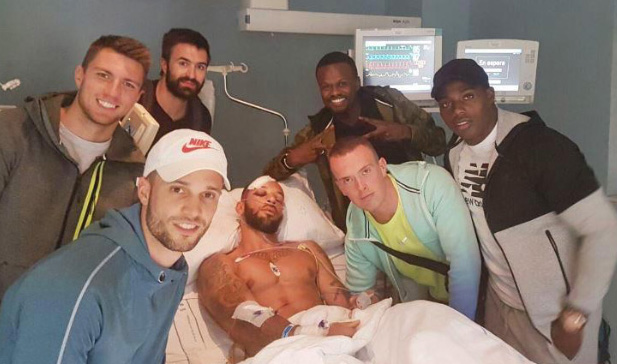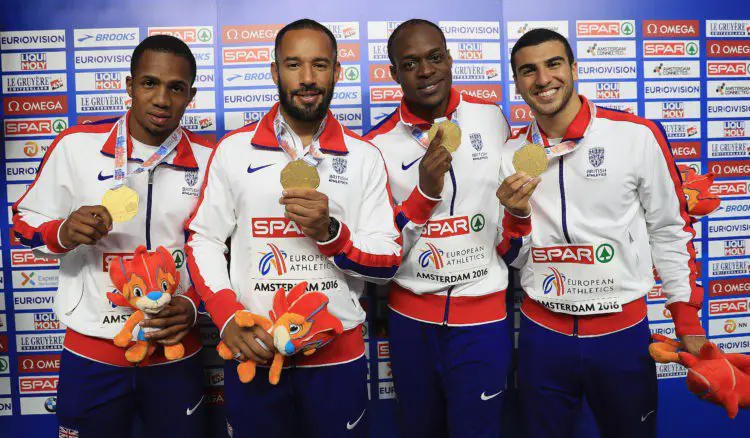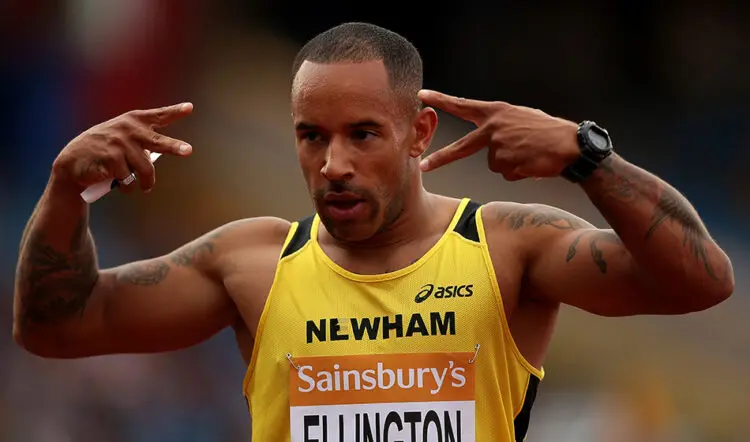The previous sprinter talks about getting back from the brink after the crash that just about value him life, his struggles with attempting to succeed in the highest stage once more and why he has discovered peace after a quiet retirement from athletics.
“So, what are the targets?” asks the physician, whereas an alarmingly emaciated James Ellington sits in a wheelchair pushed by his then coach Linford Christie.
“To be again on observe subsequent 12 months,” replies Ellington immediately. Impassive, not lacking a beat. “What do you imply by again on observe?” responds the confused guide.
“Full coaching. Competing,” says Ellington, prompting an interminable pause because the audacity of his assertion hangs within the air.
Ultimately, so quietly that he has to repeat himself to be heard, Christie breaks the silence to softly provide a extra real looking ambition for Ellington’s future: “Simply to have the ability to stroll round unsupported.”
The clip has sat on the high of Ellington’s Instagram web page for near seven years now, providing a everlasting reminder of the athlete who by no means knew when he was defeated, even when his profession seemed over and his life had so just lately been in peril. A person of unrivalled dedication, who wouldn’t bow to conference or settle for others’ limitations. A person who refused to surrender. Till, sooner or later, he did.
I final sat down for a correct interview with Ellington after I visited his west London residence within the spring of 2021. 4 years had handed because the day that modified every part, when the bike he was driving with fellow British sprinter Nigel Levine at a coaching camp in Tenerife collided with an oncoming automotive.
Ellington’s accidents have been so intensive – a compound fracture of the precise leg, a fractured left ankle, a fractured eye socket, a displaced and fractured pelvis, the lack of six pints of blood – that he was fortunate to be alive.
However when medical professionals advised him he would by no means even jog once more and not using a limp, Ellington ignored them, proving his willpower by routinely tumbling out of the wheelchair he was confined to for six weeks and crawling to do press-ups on the ground.
“The worst factor you are able to do is doubt me,” he advised me, days forward of the comeback 100m race that might see him clock a wind-assisted 10.40 alongside beginner runners at Dagenham’s Jim Peters Stadium.
His mission at that time – one which had fuelled each painful step of his restoration – was to turn out to be a triple Olympian in Tokyo that summer time. Once I questioned whether or not he may ever be content material with out reaching such an unfathomably lofty ambition, he thought-about silently for 12 seconds earlier than lastly delivering his one-word reply: “No.”

Ellington’s quiet retirement from athletics two years later didn’t generate headlines. Even British Athletics failed to say something on their social media pages in tribute to a sprinting mainstay of numerous worldwide groups; that silence nonetheless rankles at the moment. However, by that time, his plight had been largely forgotten. Ellington and the game belatedly went their separate methods.
So, it’s with nice intrigue that I organize one other interview to seek out out two most important issues: What occurred in these years since we final spoke? And, having not come near including to his a number of worldwide vests post-accident, has he been capable of finding any contentment?
The reality – and he admits it took one other two years to just accept it – is he knew his trigger was futile the second he crossed the ending line for his warmth on the 2021 Olympic trials. He had positioned fourth, clocking 11.00 in really horrendous situations with a -3.4m/sec headwind, exiting the competitors right away. The only purpose that had motivated him for years was over.
“It wasn’t even like I used to be upset,” says Ellington, 40. “It was a bizarre feeling. You already know when boxers say that they know when it’s time to cease? Properly, it was simply gone.
“Bodily I used to be alright however, flipping hell, after I crossed that line in no matter time I ran and I used to be all the way in which again there I simply thought: ‘This can be a joke’. After which right away I attempted to persuade myself that I’d attempt once more the following 12 months. However, mentally, it simply wasn’t there.”
Certainly not. Is identical man who compelled himself to coach when his physique was completely damaged suggesting he didn’t make it again to the worldwide ranks as a result of he lacked the psychological need?
“Yeah, precisely,” he continues. “Bodily, I noticed a number of what I wanted in coaching. I used to be coaching in opposition to individuals at the moment competing and doing what I wanted. However as quickly as I obtained on to a startline, in my coronary heart and head, I wasn’t feeling it. I used to be doing it in coaching, however as quickly because it got here to competing it wasn’t there. The vitality that it took to get to the place I did was a lot that the motivation was gone.
“Everybody on the road wished to take my head off as a result of my title is my title. However I wasn’t the identical James due to the crash. Guys are pumped as much as take me on and I couldn’t be arsed to run.
“Getting back from being at a excessive stage to a not-so-high stage, you possibly can’t power that motivation. That was a giant hurdle. By that point I used to be burned out. Psychologically and spiritually I used to be burned out.”

It’s a fascinating admission, however one which took him years to just accept. He returned to the British Championships the next summer time, once more exiting within the 100m heats, and meant to attempt for a 3rd time in 2023, solely to lastly faucet out following a Nationwide Athletics League meet a couple of weeks earlier than. His greatest 100m time post-crash was 10.39.
“I used to be going by way of the motions in coaching however, when it got here to competitors, I simply couldn’t wait to go residence,” he says. “It was bizarre. It was like I used to be being pulled forwards and backwards inside myself, attempting to stay to the narrative of getting again, however the ardour had gone.
“However I couldn’t step off the practice as a result of I’d mentioned that I’d get again to the place I believed I might. I used to be combating myself, actually.”
Now, a lot later than docs predicted nearly a decade in the past, he’s formally a former athlete. Having taken a 12 months off to regulate to life with out the relentless athletics grind, he’s now pursuing work as a public speaker and a velocity coach to individuals competing in different sports activities. This summer time additionally noticed the beginning of his son, 14 years after he turned a father to his daughter from a earlier relationship.
A much-delayed monetary settlement from the crash was lastly agreed out of courtroom final 12 months, with the Spanish motor insurers of Levine’s rented bike admitting legal responsibility for Ellington’s damages. He suggests the sum “positively helped”, however that restrictive Spanish legal guidelines meant it was one of many lowest payouts anyplace worldwide. The declare was not in opposition to Levine, whose athletics profession ended when he was banned for 4 years in 2018 after testing constructive for clenbuterol.
“After the crash I used to be cool with him,” says Ellington, of Levine. “I didn’t have any exhausting emotions in direction of him. Shit occurs. However then he did some foolish issues after the crash and it pissed me off as a result of my title was getting dragged into it as I used to be within the crash with him. I’ve misplaced contact with him, however there have been by no means any exhausting emotions to start with.”
There are, in reality, few athletes Ellington does nonetheless communicate to. He title checks double European 200m medallist Danny Talbot and says he stays pleasant with a lot of the GB feminine sprinters from his period. However athletics and people inside it are largely a previous reminiscence.
“Generally, if you depart a sport or one thing dangerous occurs, you realise who your pals are,” says Ellington. “I used to be disenchanted as a result of I assumed a couple of individuals in athletics have been my precise associates outdoors, however I used to be unsuitable. When that crash occurred, some individuals stepped up, and lots of people who you anticipated to be there simply disappeared into skinny air.
“I watched a little bit of the World Champs this summer time, however I’m probably not within the know. Somebody will ask if I noticed the athletics and I received’t have even recognized it was on. I’m simply probably not . Being out of that setting is good.”

Leaving athletics has not dimmed a coaching obsession that sees him work out 5 days per week and usually spar within the Brazilian martial artwork of jiu-jitsu. Coaching – pushing his completely sculpted physique to ever better heights – stays an habit that he intends to maintain eternally.
“Coaching is my vice,” he says. “I just like the outcomes of feeling sturdy and match. I feel, with the psychological aspect, if I didn’t practice I’d go mad. It retains me regulated, retains my mind occupied and retains me wholesome.
“I would like to steer by instance. You get lots of people on the market not practising what they preach. It’s crucial, within the [coaching] trade I’m in, I’m telling individuals the best way to do issues, and I would like to really be the half that I’m speaking about.”
Occasionally an ache or ache will function a reminder of the trauma his physique went by way of, however he says he’s “fortunate to not really feel any residual points” from the crash.
So, now we each know the end result, I ask the identical query that made him pause for therefore lengthy throughout our final interview. Having doggedly defied medical expectation to not solely run once more however dash quick sufficient to combine it with a few of Britain’s greatest, is he content material with all he achieved post-crash regardless of not realising the Olympic dream he had clung to?
“It’s a tough query to reply,” he replies. “As a result of I’m not on that journey now I can take myself out of it and see that I did nicely. In that sense, I did good. However, on the identical time, as a result of I wish to put myself on the market and obtain the issues I set my thoughts on, I’m not content material.
“When it ended, I can’t say I used to be tremendous unhappy or disenchanted. It was simply the top of the street. I simply accepted it. However I positively look again with delight.
“I’ve obtained good individuals round me, I’m glad, my physique is working and I’m in good condition – higher form than some athletes who’re nonetheless competing. I’m positively succeeding.”
































